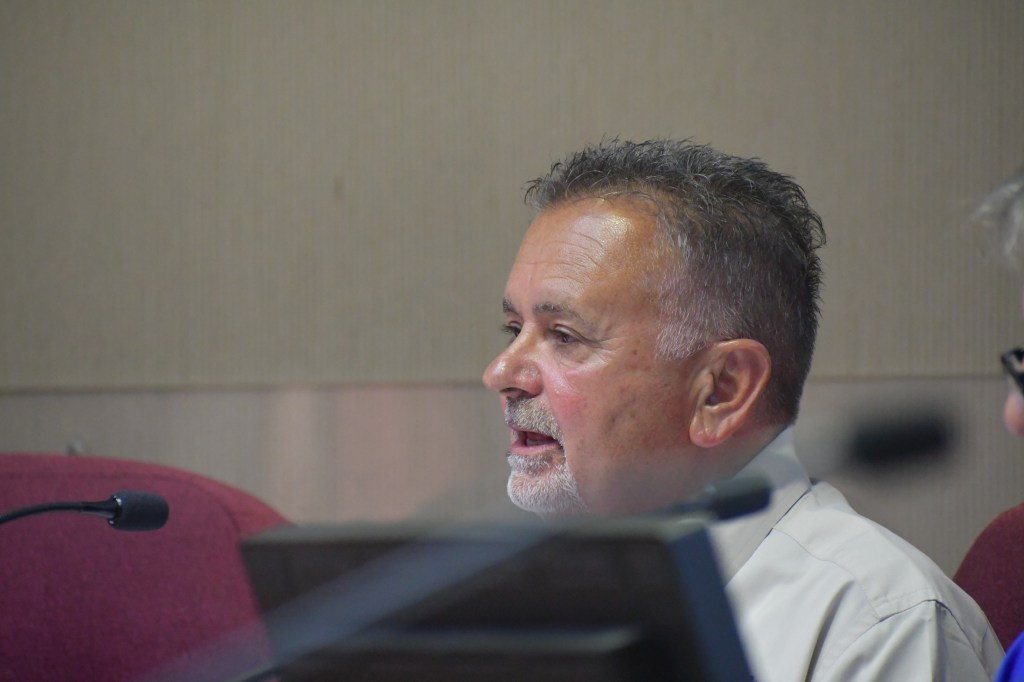Council extends moratorium on solar farms following public backlash
Published 12:00 pm Friday, July 12, 2024

- Councilman Brian Napier, who voted to extend the solar farm moratorium for an additional year, said the council was committed to making sure solar farm regulations were done right in the parish.
It’s difficult to remember a time when the Iberia Parish Council chambers on the fifth floor of the courthouse was filled with as many people as there were Wednesday evening, when residents from the Interlaken Subdivision and surrounding neighborhoods packed the room to give their say about a solar farm installation that is on the way to being built near the area.
For some of the more than a dozen speakers who addressed the council, the issue was about quality of life for people who have lived in the area and raised their families in the subdivision for decades. For others, it was about the potential loss of archaeological evidence of Acadian and Native American artifacts that are likely to be on the farmland that will be converted to a solar farm.
Trending
At issue during the meeting was a one-year moratorium introduced by Councilman James Trahan, which the council ended up unanimously approving after listening to an hour of speakers who demanded more time and thought be put into how Iberia Parish is going to regulate the emergence of the solar farm industry in Iberia Parish.
Changing The Rules
The vast majority of supporters of the moratorium that spoke Wednesday were residents of the Interlaken/Daspit Road area of town where the solar farm is set to be placed.
Since the issue of solar farms have begun to rise in Iberia Parish, neighbors in the area have been communicating with each other and sharing the same grievances about the potential of the farmland near their home to be converted into an industrial zone.
Carol Fishburne, a widow who has lived in her Interlaken home a number of years, said the peace she was looking for in her senior years would be ruined should the solar farm come to fruition.
“I’m trying to stay in my home, which I love,” Fishburne said. “Having a solar farm that I could look at from my door would just completely ruin my life. This would be so disruptive for my quality of life and my neighbors’ quality of life.”
Trending
Brenda Smith, who said she has lived in her home in the area for 43 years, agreed. To allow a solar farm disrupt the lives of her and her neighbors, Smith said, would be an insult to the families who live there.
“I love my neighborhood,” Smith said. “This would place it in danger of noise, soil, water and air pollution.”
David Degroat, who lives on Lucerne Drive near Interlaken, said if he had known the area would have been zoned industrial he would have never bought his house years ago.
“Meeting our neighbors, they never dreamed the rules could be changed in the middle of the game and we could live next to an industrial solar project,” Degroat said. “Why should a few families be able to cause harm to other families just to make more money?”
The lone dissenter of the night was Josh Trosclair, who said he represented a number of environmental groups and has fought things like pipeline damage in the past.
“I’m sorry, but these solar farms are not that,” Trosclair said. “I understand if you have an aesthetic issue with solar farms but at the end of the day you’re entitled do what you bought with your money, not what other people do and not what an entire parish does.”
Wiping Out History
The solar farm issue also brought in people concerned about the negative historical effects a solar farm could incur.
Mostly at issue was The New Acadia Project, an archaeological project headed by a combination of local residents and professionals at the University of Louisiana at Lafayette to find the first settlement that Joseph “Beausoleil” Broussard and his settlers had set up when they first came to Louisiana.
The project has garnered interest over the years due to its significance in the Cajun story, and the list of possible sites includes the acreage that is up to be rezoned for solar farming.
Krista Bernard, an Iberia Parish resident, told the council that she is concerned about the heritage that could be lost with the rezoning of the land.
“The Acadians came here 300 years ago and their gravesites are in this area,” Bernard said. “There are Native American aspects in this property too. Cajuns started right here in Iberia Parish and it’s about to be wiped out.”
Mark Rees, an archaeologist at UL Lafayette who has done much of the field work for The New Acadia Project over the years, also attended the meeting to voice his concerns about a comprehensive archaeological study needing to be done before anything happens to the land.
“My main point is if there’s going to be development of this land we should all know what’s going to be lost by the development,” Rees said. “These sites are occasionally lost when there’s not a full and comprehensive archaeological survey. There should be a survey of the entire area that’s going to be developed so we have the possibility of an informed decision.”
Councilman Scott Ransonet, who represents the Loreauville area, agreed. With the recent addition of the Acadian Odyssey Monument in Loreauville, Ransonet said the work done for the New Acadia Project could be a boon for the entire state, not just Iberia.
“We need to do this right and make sure we have a study one,” he said.
Due Diligence
After an hour of listening, Iberia Parish Council members found themselves agreeing with the majority of the speakers present.
The moratorium, which is a renewal of a six-month moratorium that was voted on early this year, is part of a larger process of Iberia Parish Government determining an ordinance for how solar farms are going to be regulated in the parish.
Councilman Brian Napier, who initially introduced the moratorium, said he and his fellow council members were committed to creating regulations that had the right intentions at heart.
“If we’re going to do an ordinance, we want to do it right,” Napier said. “We don’t want to rush something that we’re going to regret. Once this starts, I have no doubt there’s going to be others. We’re not sure where we’re going to go yet but we’ve got to do our due diligence.”
Councilman Natalie Broussard echoed the statement, and added that while the issue of regulation is a complicated one, the people living in the Interlaken area deserve to know the future of their property.
“To have another year of unrest is an injustice to you,” Broussard said to the local residents. “We need to be very diligent and take whatever time is needed but I don’t think we should waste any time. You deserve to know what your future holds. I’m asking that my council be diligent and an engine pushing this to a resolution for all these people.”
The council unanimously voted to extend the moratorium for one year.





